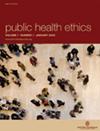Developing an ethical evaluation framework for coercive antimicrobial stewardship policies
IF 1.4
3区 哲学
Q2 ETHICS
引用次数: 0
Abstract
Antimicrobial resistance (AMR) has been declared one of the top ten global public health threats facing humanity. To address AMR, coercive antimicrobial stewardship policies are being enacted in some settings. These policies, like all in public health, require ethical justification. Here, I introduce a framework for ethically evaluating coercive antimicrobial stewardship policies on the basis of ethical justifications (and their limitations). I consider arguments from effectiveness; duty of easy rescue; tragedy of the commons; responsibility-tracking; the harm principle; paternalism; justice and development; a precautionary approach; and professional duties. I consider how these justifications might form the basis for developing a comprehensive ethical framework, and the need for this to be context-specific and aligned with the priorities, evidence and needs of the particular jurisdictions in which a policy is to be enacted. I demonstrate how the ethical justifications might be used by reference to an example policy of the EU ban on the use of certain human-critical antibiotics for livestock, before concluding with challenges for further development of the framework.制定强制性抗菌药物管理政策的伦理评估框架
抗菌素耐药性(AMR)已被宣布为人类面临的十大全球公共卫生威胁之一。为解决 AMR 问题,一些国家正在制定强制性的抗菌药物管理政策。与公共卫生领域的所有政策一样,这些政策也需要伦理依据。在此,我将介绍一个框架,根据伦理理由(及其局限性)对强制性抗菌药物管理政策进行伦理评估。我考虑的论据包括有效性、易救义务、公地悲剧、责任追踪、危害原则、家长制、正义与发展、预防方法和专业职责。我考虑了这些理由如何构成制定全面伦理框架的基础,以及该框架是否需要针对具体情况,并与颁布政策的特定司法管辖区的优先事项、证据和需求相一致。我以欧盟禁止在牲畜身上使用某些对人类至关重要的抗生素的政策为例,说明了如何使用伦理理由,最后提出了进一步发展该框架的挑战。
本文章由计算机程序翻译,如有差异,请以英文原文为准。
求助全文
约1分钟内获得全文
求助全文
来源期刊

Public Health Ethics
PUBLIC, ENVIRONMENTAL & OCCUPATIONAL HEALTH-MEDICAL ETHICS
CiteScore
3.10
自引率
9.50%
发文量
28
审稿时长
>12 weeks
期刊介绍:
Public Health Ethics invites submission of papers on any topic that is relevant for ethical reflection about public health practice and theory. Our aim is to publish readable papers of high scientific quality which will stimulate debate and discussion about ethical issues relating to all aspects of public health. Our main criteria for grading manuscripts include originality and potential impact, quality of philosophical analysis, and relevance to debates in public health ethics and practice. Manuscripts are accepted for publication on the understanding that they have been submitted solely to Public Health Ethics and that they have not been previously published either in whole or in part. Authors may not submit papers that are under consideration for publication elsewhere, and, if an author decides to offer a submitted paper to another journal, the paper must be withdrawn from Public Health Ethics before the new submission is made.
The editorial office will make every effort to deal with submissions to the journal as quickly as possible. All papers will be acknowledged on receipt by email and will receive preliminary editorial review within 2 weeks. Papers of high interest will be sent out for external review. Authors will normally be notified of acceptance, rejection, or need for revision within 8 weeks of submission. Contributors will be provided with electronic access to their proof via email; corrections should be returned within 48 hours.
 求助内容:
求助内容: 应助结果提醒方式:
应助结果提醒方式:


